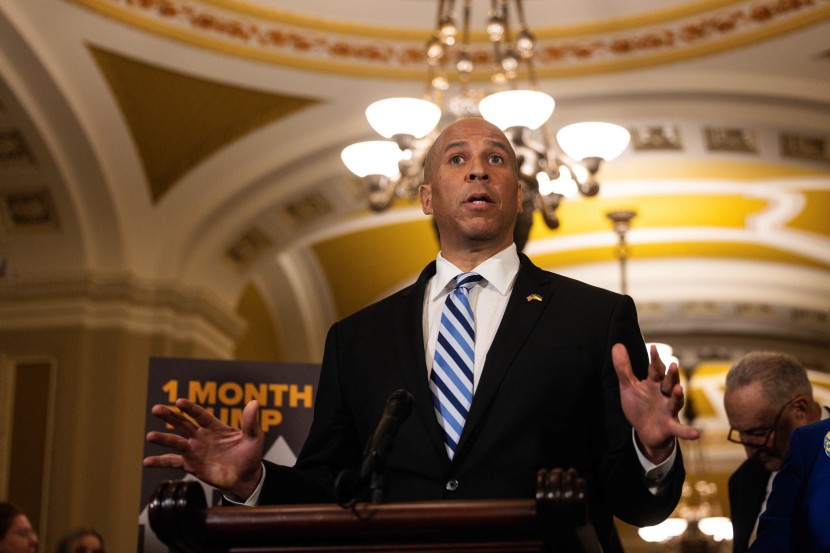
Sen. Cory Booker took to the Senate floor on Monday night, launching into an impassioned speech against the Trump administration's policies.
His marathon address, which stretched into Tuesday afternoon, placed him on the verge of a historic record as he and fellow Democrats voiced their opposition.
Booker, a Democrat from New Jersey, began his speech at 7 p.m. ET, vowing to continue "for as long as I am physically able." By 2 p.m. Tuesday, he remained standing, papers in hand and glasses on, pausing only to take questions from colleagues.
His effort drew significant public attention, with over 52,000 viewers tuning in to his YouTube livestream by early Tuesday afternoon. In a video posted to social media before his speech, Booker explained his motivation, stating, "I've been hearing from people all over my state and indeed all over the nation calling upon folks in Congress to do more, to do things that recognize the urgency, the crisis of the moment. And so we all have a responsibility, I believe, to do something different, to cause — as [late Rep.] John Lewis said — 'good trouble,' and that includes me."
Throughout his extended speech, Booker sharply criticized President Trump, White House senior adviser Elon Musk, and various administration policies. He accused them of displaying a "complete disregard for the rule of law, the Constitution and the needs of the American people."
Covering a broad spectrum of topics, Booker's speech touched on health care, Social Security, immigration, the economy, public education, free speech, and foreign policy. He read excerpts from letters sent by affected constituents and referenced recent remarks from world leaders. In his opening statement, Booker declared, "In just 71 days, the president has inflicted harm after harm on Americans' safety, financial stability, the foundations of our democracy and any sense of common decency. These are not normal times in our nation. And they should not be treated as such in the United States Senate."
Neither Trump nor Musk has responded publicly to the speech. The moment comes amid internal tension within the Democratic Party after nine Democrats supported a Trump-backed spending bill last month, preventing a government shutdown but frustrating voters who want more resistance to the president's agenda.
Unlike past marathon speeches in the Senate, Booker did not resort to reading from the phone book or children's literature. Instead, he remained focused on the impact of Trump's policies on everyday Americans, weaving together domestic and foreign policy critiques.
As the speech entered its 15th hour, Booker reassured his audience, saying he still had "fuel in the tank." At the 16-hour, 24-minute mark, he glanced at the time and admitted, "We are way behind the schedule of where we wanted to be at this point." However, he did not immediately indicate he was wrapping up. "And so to obey my staff, as senators are told to do, I want to move quickly to housing issues," he added.
The long speech paused briefly at noon for the traditional Senate prayer, led by Chaplain Barry Black, who acknowledged those working behind the scenes: "floor staff, Capitol police, stenographers, the pages and all those who have worked throughout the night."
Although Booker's speech stretched for hours, it did not technically qualify as a filibuster, which is typically used to delay or block legislation. According to the Congressional Research Service, Senate rules allow a senator recognized by the presiding officer to speak for as long as they wish unless special debate limits are imposed.
"They usually cannot be forced to cede the floor, or even be interrupted, without their consent," the Congressional Research Service explains. However, senators must adhere to specific rules, including remaining standing and speaking continuously.
Sen. Chris Murphy, D-Conn., noted Booker's strategic approach, sharing on X (formerly Twitter) that Booker "had a Senate page take his chair away to eliminate any temptation to sit down." Booker also relied on a well-known tactic—yielding for questions from fellow Democrats, allowing brief moments of relief while maintaining control of the floor.
"I will yield for a question while retaining the floor," Booker repeated whenever a senator requested to interject.
More than a dozen Democratic senators joined Booker on the floor throughout Tuesday morning, including Murphy, Sen. Andy Kim of New Jersey, Sen. Peter Welch of Vermont, Sens. Dick Durbin and Tammy Duckworth of Illinois, Sen. Kirsten Gillibrand of New York, Sens. Tina Smith and Amy Klobuchar of Minnesota, Sen. Ron Wyden of Oregon, Sen. Raphael Warnock of Georgia, Sen. Chris Coons of Delaware, Sen. Mark Warner of Virginia, Sens. Elizabeth Warren and Ed Markey of Massachusetts, Sens. Chris Van Hollen and Angela Alsobrooks of Maryland, Sen. Maggie Hassan of New Hampshire, and Sen. Ben Ray Luján of New Mexico.








